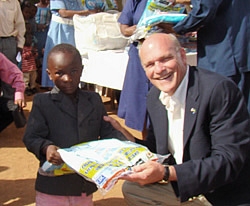This morning at the National Press Club, I joined the Roll Back Malaria Partnership (RBM) to launch the third report from the Progress & Impact Series “Saving Lives with Malaria Control: Counting Down to the Millennium Development Goals”. The report states that the lives of almost three quarters of a million children in 34 African countries are estimated to have been saved in the past 10 years through the use of insecticide treated mosquito nets, indoor residual spraying, and preventive treatment of malaria during pregnancy. The Lives Saved Tool (or LiST model) provides the first assessment of lives saved based on the level of coverage achieved with currently available malaria prevention tools. The report estimates that an additional 3 million lives could be saved by 2015 if the world continues to increase investment in tackling the disease.
The results in global malaria prevention and control are encouraging, but, as we have seen before, this progress is fragile and can be easily reversed. As we expand and consolidate these gains, it is vitally important to ensure that our efforts not only maintain momentum, but also continue to adapt to emerging challenges such as drug and insecticide resistance. That’s why a key imperative in the United States’ Strategy for meeting the MDGs is to leverage innovation as a powerful catalyst for development.
The U.S. Government’s commitment to fight malaria is a key component of our nation’s foreign assistance strategy and the Administration’s Global Health Initiative to expand the promise of good health that is the foundation of stronger and more stable families, communities, and societies. On behalf of the American people, the U.S. Government has taken extraordinary steps to curb the spread of this preventable and curable disease. Working with national governments and other donors, the President’s Malaria Initiative (PMI), led by USAID and implemented together with the Centers for Disease Control and Prevention, reached more than 50 million people in the past year with highly effective malaria prevention or treatment measures in 15 focus countries in Africa.

